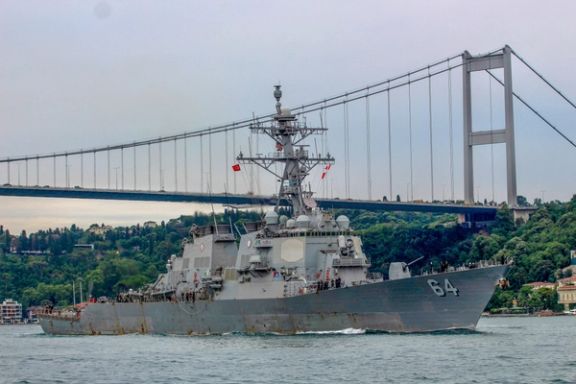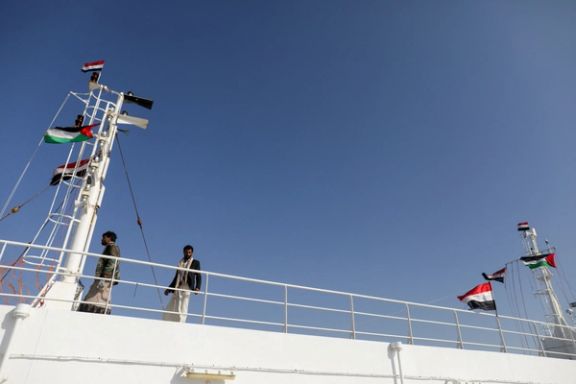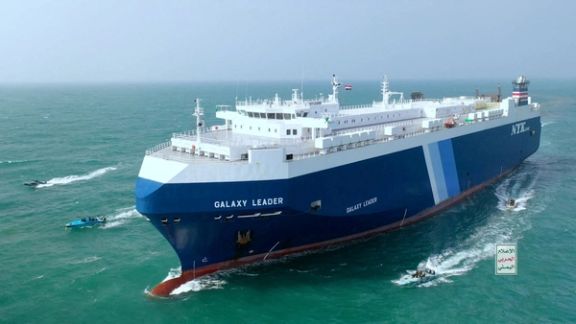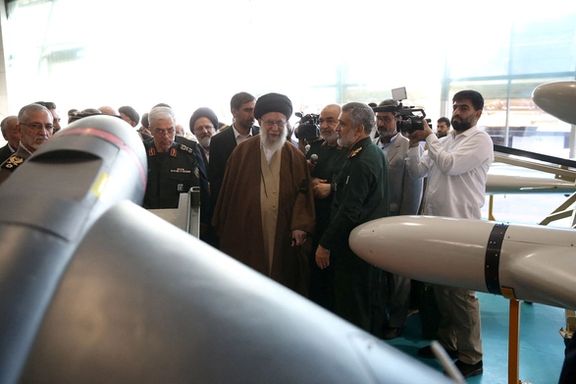Houthis Attack Tanker As US Warship Downs Drone

Yemen’s Houthis fired two missiles that missed a commercial tanker carrying jet fuel and headed for the Suez Canal, Associated Press quoted a US official as saying.

Yemen’s Houthis fired two missiles that missed a commercial tanker carrying jet fuel and headed for the Suez Canal, Associated Press quoted a US official as saying.
A US Navy warship also shot down a suspected Houthi drone flying in its direction during the same incident, the official said. These incidents came after repeated threats to shipping issued by Houthi officials in the past two days.
The tanker, Ardmore Encounter, was transporting Indian-made jet fuel apparently not destined for Israel. When Iran-backed Houthis began their attacks on vessels last month their declared targets were ships bound for Israel. However, recently they threatened all shipping passing through the Red Sea. The Ardmore is reportedly headed for Europe.
The Marshall Islands-flagged tanker was also threatened by skiffs loaded with men trying to board the vessel, AP reported. The tanker had armed guards on board who fired on the would-be hijackers and drove them off. The Ambrey private intelligence firm said that “No one boarded the vessel, and all crew members are safe and accounted for.”
Although Iran has avoided direct military involvement in the Gaza war despite its long-standing threats against Israel, its armed proxy forces in Iraq, Syria and Yemen have launched more than 90 attacks. US bases in the region and international shipping have been targets for Iran’s “Resistance Front.”

Yemen’s Houthis fired two missiles that missed a tanker carrying jet fuel and headed to the Suez Canal, a US official was quoted as saying by the Associated Press.
A US Navy warship also shot down a suspected Houthi drone flying in its direction during the same incident, the official said. These incidents came after repeated threats issued by Houthi officials in the past two days.
Earlier on Wednesday, a Houthi official said his group possesses “formidable leverage” against countries that participate in a naval coalition in the Red Sea.
Mohammed Al Bukhaiti issued the threat after news emerged that the United States was discussing a naval coalition with 12 countries to protect shipping in the Red Sea. The Houthi official was speaking to Sama News, a Palestinian outlet.
Iran-backed Houthis have launched numerous attacks against commercial vessels in the strategically vital shipping lanes in retaliation for Israel’s military operation in Gaza.
On Tuesday, a senior official from Yemen's Houthis warned cargo ships in the Red Sea to avoid traveling toward Israel, after the group claimed an attack on a commercial tanker earlier in the day.
The Houthis earlier said they hit a Norwegian commercial tanker with a missile in their latest protest to Israel's bombardment of Gaza, underlining the risks of a conflict that has shaken the Middle East.
Al Arabiya has reported that according to a Pentagon official, the Biden administration is in talks with 12 allied countries to form a task force to secure the passage of commercial vessels in the Red Sea.

However, the Houthis mostly attack the vessels with missiles and drones and navies trying to protect the shipping lanes need to be able to shoot down every incoming projectile. This would not fully secure the right of safe passage, as long as Houthis are not deterred to seize their attacks.
Biden administration critics have argued for retaliation against Houthis and other Iranian backed militia forces in the region. Militant groups in Syria and Iraq have launched around 90 attacks so far against US bases, with a few US retaliatory strikes.
The US administration, however, seems to be relying more on diplomatic contacts to prevent the attacks. On Wednesday, Secretary of State Antony Blinken spoke with Iraqi Prime Minister Mohammed Shiaa al-Sudani, condemning a recent attack on the US embassy in Baghdad, as well as the series of attacks on American personnel in Iraq and Syria.
An announcement by the State Department said, “The Secretary noted that the attacks are being carried out by militias who are acting with the support of Iran and undermining Iraq’s sovereignty and independence. They committed to remain in close contact over the coming days and weeks.”
The attacks in the Red Sea have overshadowed rocket and drone attacks against US forces. In addition to avoid heading toward Israel, which the Houthis referred to as "occupied Palestine", ships that pass Yemen should keep radios turned on, and quickly respond to Houthi attempts at communication, Mohamed Ali al-Houthi, head of Yemen's Houthi supreme revolutionary committee, said in a message on the X social media platform.
Al-Houthi also warned cargo ships against "falsifying their identity" or raising flags different from the country belonging to cargo ship owner.
The Iran-backed group attacked the tanker, the STRINDA, because it was delivering crude oil to an Israeli terminal and after its crew ignored all warnings, Houthi military spokesperson Yehia Sarea had previously said in a statement.
The Houthis have waded into the Israel-Hamas conflict - which has spread around the region - attacking vessels in vital shipping lanes and firing drones and missiles at Israel more than 1,000 miles from their seat of power in the Yemeni capital of Sanaa.

Iran's foreign ministry says there is “sufficient evidence” for the charge of espionage brought against a Swedish EU diplomat whose trial began in Tehran Saturday.
Iran's judiciary on Sunday accused Johan Niels Floderus, a 33-year-old Swedish citizen and EU diplomat of extensive intelligence collaboration with Israel against the Islamic Republic.
The foreign ministry spokesman Naser Kanaani on Monday backed the hardliner Judiciary that has accused other foreigners in the past for similar crimes. Kanaani insisted that charges and crimes committed by Floderus have been clearly defined by the judiciary and sufficient evidence has been provided.
However, similar trials against foreigners in the past were held behind closed doors, without due process of law.
Judicial process will be followed in Floderus’ case, Kanaani said, implying that there could be no intervention by the foreign ministry or other authorities to secure his release from prison. “The judiciary will perform its duties as an independent authority,” he said.

Kanaani added that the Swedish government has been informed of the details of the case, but there is no evidence of that.
“The defendant has been active against the Islamic Republic of Iran in the field of information collection for the benefit of the Zionist regime in the form of subversive projects conducted by well-known American, Israeli and European institutions active in this area,” a statement by the prosecutor read at the first session of Floderus’ trial Sunday alleged.
The prosecutor has demanded sentencing Floderus in accordance with article 286 of Iran's Islamic Penal Code. This article stipulates that anyone found guilty of extensive crimes against the Islamic Republic’s domestic or international security leading to “serious disruption in public order and security in the country” should be sentenced to death for “corruption on earth”.
"Johan Floderus has been arbitrarily detained and every accusation and charge is false," a spokesperson for Sweden's foreign ministry said in an emailed comment to Reuters on Sunday.
Top EU foreign policy chief Josep Borrell also urged Iran on Sunday to free Floderus immediately. "I persistently raise the case at every occasion and contact with the Iranian authorities, since his detention, requesting his liberation," he said.
"We are seeking clarification and more information from them, in closest coordination with the Swedish authorities who bear the consular responsibility," he added.
Many believe that the Swedish EU diplomat whose family and friends say was on holiday in Iran is a victim of the Islamic Republic’s ‘hostage policy’.
The Islamic Republic has widely been accused of routinely arresting foreigners and dual citizens to use them as bargaining chips against Western countries and can demand the release of its own nationals held in Sweden such as Hamid Nouri, a former deputy prosecutor, in return for freeing Floderus, a citizen of Sweden and the European Union in danger of execution.
Nouri is serving a life sentence in Sweden for human rights violations as a prison official in 1980s when thousands of detainees were hanged in Iranian prisons after summary trials that sometimes lasted only minutes.
Iran's judiciary recently called on Swedish authorities to ensure “fair and appropriate procedures” regarding Nouri’s appeal which started in January. The verdict of the appeals court is scheduled to be announced on December 19.
The unfreezing of $6b by the United States a few months ago was widely interpreted as the cost of freeing five American-Iranian hostages that Iran had held for several years.
Floderus, who previously worked on the Afghanistan desk of the EU’s external services department, was detained on April 17, 2022, at Tehran’s Imam Khomeini Airport while waiting to depart Iran.
He was covertly detained for over 500 days before a report by The New York Times in September brought his circumstances to public attention. .

Yemen's Iran-backed Houthis said on Tuesday they attacked the Norwegian commercial tanker STRINDA in their latest operation against commercial shipping in the Red Sea.
The group targeted the tanker with a rocket after the crew refused to respond to all warnings, Houthi military spokesperson Yehia Sareea said in a televised statement.
He vowed that the Houthis would continue blocking ships heading to Israeli ports until Israel allows the entry of food and medical aid into the Gaza Strip - more than 1,000 miles from the Houthi seat of power in Sanaa.
On Saturday, Sareea had threatened that Houthis would target all ships heading to Israel, regardless of their nationality. He also warned all international shipping companies against dealing with Israeli ports. "If Gaza does not receive the food and medicine it needs, all ships in the Red Sea bound for Israeli ports, regardless of their nationality, will become a target for our armed forces."
The attack on the tanker STRINDA took place about 60 nautical miles (111km) north of the Bab al-Mandab Strait connecting the Red Sea and the Gulf of Aden at about 2100 GMT, a US official told Reuters. A second US official said the STRINDA was able to move under its own power in the hours after the attack.
"There were no US ships in the vicinity at the time of the attack, but the (US Navy destroyer) USS MASON responded to the M/T STRINDA's mayday call and is currently rendering assistance," the US military's Central Command, which oversees American forces in the Middle East, said in a statement posted on social media platform X.
The attack caused a fire and damage but no casualties, the US military said in a statement.
The Houthi spokesman said that the group had managed to obstruct the passage of several ships in recent days, acting in support of the Palestinians.
The Iran-backed group controlling large parts of Yemen, began attacking Israel and international shipping in November, after other Iranian-backed militias in Iraq and Syria began targeting US bases in the two countries. Iran has clearly decided not to directly get involved in the Gaza war, but its proxies have been trying to exert military pressure on Israel and the United States. IRGC-affiliated media in Tehran reported the Houthi statement about targeting the tanker on Tuesday, without further comment.
The chemical tanker is now headed for a safe port, the ship's Norwegian owner, Mowinckel Chemical Tankers, told Reuters. The STRINDA tanker's crew of 22 from India are all unhurt, Mowinckel Chair Geir Belsnes said.
The chemical tanker is Norway flagged, and its Norwegian owner, Mowinckel Chemical Tankers, and manager Hansa Tankers could not be immediately reached for comment outside office hours.
The STRINDA had loaded vegetable oil and biofuels in Malaysia and was headed for Venice, Italy, data from ship tracking firm Kpler showed.
It was not immediately clear whether the STRINDA had any ties to Israel.
During the first week of December, three commercial vessels came under attack in international waters, prompting a US Navy destroyer to intervene.
The Houthis also seized last month a British-owned cargo ship that had links with an Israeli company.
The United States and Britain have condemned the attacks on shipping, blaming Iran for its role in supporting the Houthis. Tehran says its allies make their decisions independently.
Saudi Arabia has asked the United States to show restraint in responding to the attacks.
With reporting by Reuters

An Austrian man carried out "hostile reconnaissance" against Iran International, which could have been used in an attack on the channel, prosecutors told a London court on Monday.
Just hours after flying in from Austria in February, Magomed-Husejn Dovtaev is said to have tried to record the security arrangements of the Persian-language Iran International channel's headquarters in west London, the court heard.
Dovtaev, 31, is charged with a single count of attempting to collect information likely to be useful to a person committing or preparing an act of terrorism. He has pleaded not guilty.
Prosecutor Nicholas de la Poer told London's Old Bailey on Monday that Iran International became a target for reprisals following its reporting on the death in custody of Mahsa Amini in Iran last year and subsequent protests in the country.
Iran's minister of intelligence later declared Iran International a terrorist organization, de la Poer said, which meant its employees "became targets for violent reprisals".
"The prosecution does not suggest that (Dovtaev's) purpose on Feb. 11 was to carry out such an attack or that it was intended that he would participate in an attack on a further date," de la Poer said.
But, de la Poer added, Dovtaev went to Iran International's headquarters, "no doubt acting on the instructions of others", in order to gather information about its security arrangements.
He told the jury this information would be useful to anyone planning a terrorist attack against Iran International.
Dovtaev's visit "demonstrates that planning by others was already under way", de la Poer said, saying that videos pre-dating Feb. 11 of Iran International's headquarters and security protection had been saved to his phone.
The trial, which is expected to conclude next week, continues.

The EU has brought sanctions against Iranians involved in the manufacture of unmanned aerial vehicles (UAVs) used by Russia in Ukraine.
The European Council – the EU’s governing body - has implemented the new set of stringent measures against six individuals and five outfits engaged in Iran's development and production of the drone.
This represents the first application of measures within a newly established framework aimed at restricting Iran's military support for Russia's unjust war of aggression against Ukraine. The measures align with earlier sanctions against Iranian drone-related activities.
The new measures target Iranian company Shakad Sanat Asmari, its CEO, deputy CEO, and chief scientist. Also engaged in the production of UAV components are Baharestan Kish Company and its managing director, Saad Sazeh Faraz Sharif and its CEO, while Sarmad Electronic Sepahan Company provides aerospace engineering services. Kimia Part Sivan Company assists Iran's Islamic Revolutionary Guard Corps Quds Force (IRGC-QF) in advancing the UAV program. All have now been subjected to the measures.
The sanctions encompass asset freezes and travel bans within the European Union. Any supply of funds or economic resources, whether directly or indirectly benefiting those listed, is strictly forbidden.
The Council has strongly criticized and declared as unacceptable any type of military assistance from Iran, encompassing the transfer of UAVs to Russia's war of aggression against Ukraine. The arms provided by Iran have been employed indiscriminately by Russia, leading to extensive destruction and human suffering among Ukraine's civilian population and infrastructure.